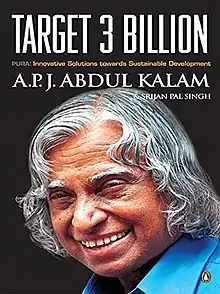 | |
| Author | A. P. J. Abdul Kalam and Srijan Pal Singh |
|---|---|
| Country | India |
| Language | English |
| Subject | Economy of India |
| Publisher | Penguin Books |
Publication date | 15-Dec-2011 |
| ISBN | 978-0-14-341730-9 |
Target 3 Billion is a book by the former President of India, A. P. J. Abdul Kalam, and Srijan Pal Singh.[1] The book highlights the issues prevailing in rural India and suggests measures to improve standards of living. It focuses on the inclusive development project called PURA (Providing Urban Amenities in Rural Areas). The book plans to improve the standard of living amongst the poor rural population through voluntary campaigns such as community's participation and entrepreneurship.[2]
It cites the work of Fabio Rosa who helped in changing the structure of Palmares, a rural district in Brazil, by rural electrification. The access to water and electricity and better agricultural methods had led to prosperity in the region. Further, it describes Magarpatta, the organisation of Magarpatta city, which now provides home to over 35,000 people and the development of an IT park.[3]
Synopsis by chapter
Each chapter has a topic that consists of a set of essays on different aspects of that main topic:
The 'Other' Half of Mankind
- The Changing World and Its Connectedness
- Bridging the Gap Between Yesterday's Methods and the Problems of the Future
- The Disparity is Global
- The Rise of the New Village
- India as a Focal Examples
Sustaining the Growth Trajectory
- A Vision of India in 2020
- Integrated Action for a Developed India
- India in 2011
- What is Needed
- A Review of 'Urbanization'
- The Path Ahead
- Rural India: Opportunity and Challenge
Sustainable Development Systems and PURA

- Sustainable Development
- Sustainable Development and Peaceful Societies
- Constituents of Sustainable Development
- The Evolution of a Sustainable Development System in India
- What is PURA
- Classification of PURA
- Moving Ahead on PURA
Agriculture and PURA
- The Relevance of Agriculture
- The Indian Agriculture Sector: The Farm
- Interaction With Farmers at Rashtrapati Bhavan
- What Targets Should Sustainable PURA Have?
- Taking Technology to the Fields
- Loni PURA
- Live Demonstration Farms in Chitrakoot PURA
- Seeds Clubs at Chitrakoot PURA
- Warana Cooperative Sugar Factory
- The First Green Revolution
- Agriculture Reforms in the State of Gujarat
- Low Water Efficiency in Agriculture
- Advanced Research and Development and Market Management in Agriculture
- National Milk Vision of India
- Processing and Marketing
- World Trade
- Launch of National Milk Vision
- The Fishing Industry in the Country
- Challenges for the Indian Fisheries Sector
- Towards India's Second Green Revolution
- The Low Vision
- Developed India
Effecting a Social Transformation
- A Need for Societal Focus
- The Gap in Rural-Urban Amenities
- The Linkage Between Economic and Social Assets
- India's Current Ambience: Creating Societal Amenities
- Creating a Society Based on Knowledge and Skills
- Challenges in Health Care at the Rural Level
- Creating an Outcome-Oriented Approach and an Integrated Problem-Solving Outlook
- A New Generation of Social Enrepreneurs
- Creating a Value-Based Society
- Achieving an Integrated Health Mission for the Loni PURA Complex
- Bringing Quality Goods to PURA Through Cooperative Supermarkets
- Meenakshi Mission PURA
- Advant of New Socio-Economic Tools
References
- ↑ "Arts / Books : New arrivals". The Hindu. 2012-01-09. Retrieved 2012-02-16.
- ↑ "Book Review: Target 3 Billion by A.P.J. Abdul Kalam,Srijan Pal Singh|uRead.com-Books|online bookstore|9780143417309". Uread.com. Retrieved 2012-02-16.
- ↑ "Penguin India". Archived from the original on January 28, 2012. Retrieved February 4, 2012.